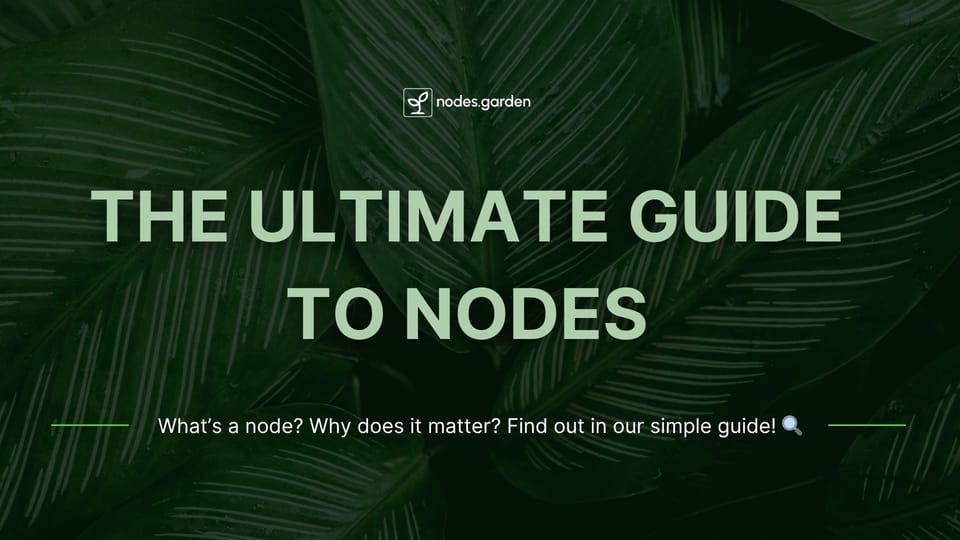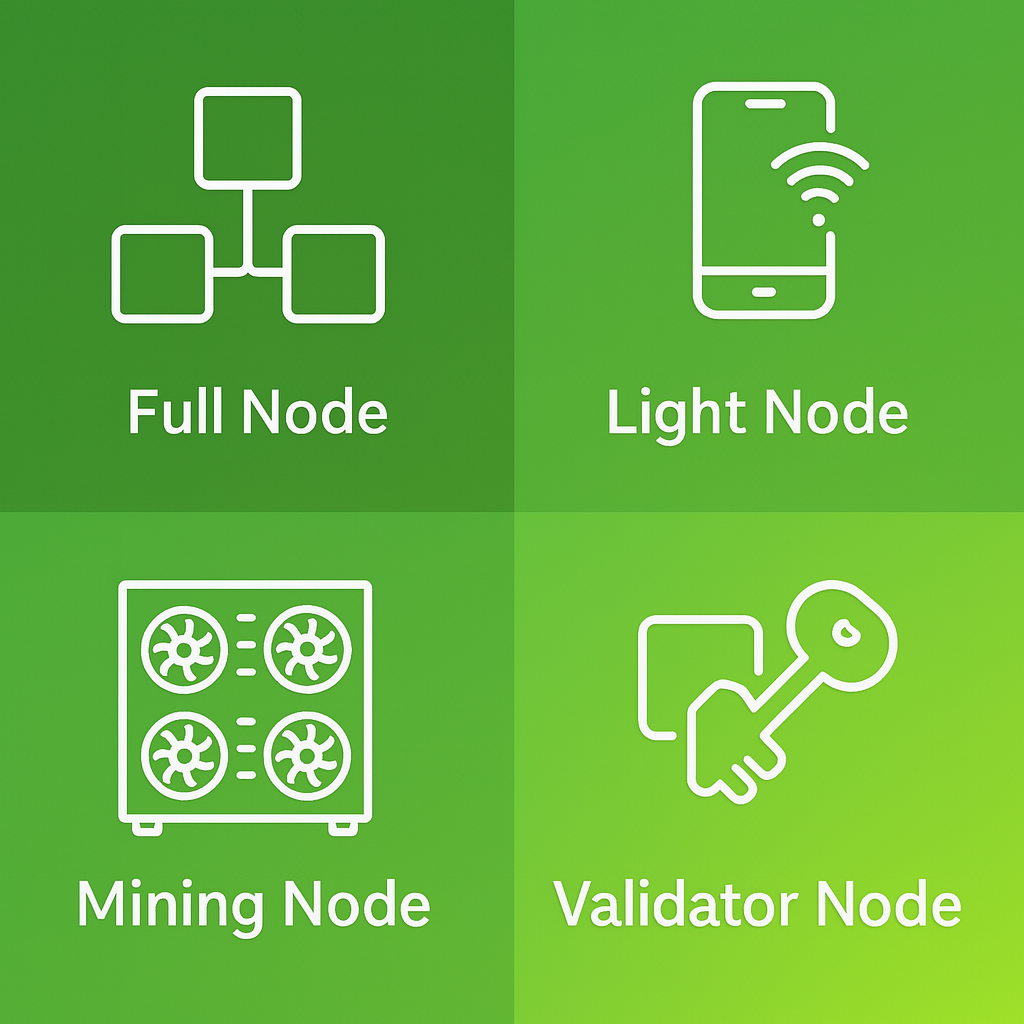The Ultimate Guide to Nodes

Hey, guys! If you've ever wondered what nodes are and why they're important, you're in the right place. We, nodes.garden team, created a guide for you. This guide is designed to be friendly and easy to understand, so whether you're new to crypto or looking to deepen your knowledge, let's dive in together.
What Exactly Is a Node?
Imagine a node as a computer that's connected to a blockchain network. It's like being part of a giant, worldwide team where each member helps keep the network running smoothly. Nodes store and share information, verify transactions, and ensure everything on the network is accurate and secure. When we refer to a computer, we don't necessarily mean a home PC. Nodes are typically launched on servers, which helps increase the node's uptime.
Different Types of Nodes

Nodes can do different jobs depending on their type and the cryptocurrency they support. Here are the main types of nodes:
Full Nodes
- What They Do: Full nodes download and store the entire blockchain. They check and confirm all transactions and blocks, helping to keep the network decentralized and secure.
- Why They're Important: By verifying every transaction, they ensure the integrity of the network.
Light Nodes
- What They Do: Light nodes don't keep the whole blockchain. Instead, they download only the block headers and rely on full nodes to verify transactions.
- Benefits: They're smaller and require less storage and computing power.
Mining Nodes
- What They Do: Mining nodes participate in mining by creating new blocks and adding them to the blockchain.
- How They Work: They solve complex math problems to confirm transactions and earn rewards in new coins.
Validator Nodes
- What They Do: Used in networks that run on Proof of Stake (PoS) algorithms.
- How They Work: Validator nodes check and approve transactions and blocks by staking their own coins (called a "stake").
Why Blockchain Projects Need Node Operators and Reward Them
Blockchain projects rely on node operators to maintain a decentralized, secure, and efficient network. Here's why node operators are essential:
- Network Security and Validation: Nodes validate transactions and blocks, ensuring that only legitimate transactions are recorded. This prevents fraud and maintains the integrity of the blockchain.
- Decentralization: A greater number of nodes reduces the risk of centralization, making the network more resilient to attacks and censorship. Decentralization is a core principle of blockchain technology.
- Transaction Propagation: Nodes help in propagating transactions and blocks throughout the network, facilitating smooth and quick transactions.
- Consensus Mechanism Support: Nodes participate in the consensus mechanism (like Proof of Work or Proof of Stake), which is crucial for the network to agree on the state of the blockchain.
To support and encourage node operators, blockchain projects often provide rewards:
- Incentivizing Participation: Rewards motivate individuals and organizations to run nodes, which strengthens the network by increasing its size and decentralization.
- Compensating for Resources: Running a node consumes computational power, storage, and bandwidth. Rewards help offset these operational costs.
At nodes.garden, we run nodes for over 45 projects, including Aztec, Gensyn, Story, Nillion, Farcaster, NuLink Network, 0G Labs, Shardeum and many others. You can launch any number of nodes you need in just a couple of minutes. You don't need technical knowledge for this.
What's in It for You?

Potential Rewards
Some networks offer incentives for running nodes, especially masternodes. This can be a way to earn passive income in cryptocurrency.
Here are some examples of projects that have given out good rewards recently:
- IO.net: Had an airdrop of up to $400-$800 for each CPU node that users ran for at least one month. The return on investment was 10x-20x
- Taiko: Rewarded node operators with $3,000-$8,000 for each node for running nodes for 4-12 months. The return on investment was 25x-30x
- Avail Project: Gave out up to $10,000 for each node! The return on investment was an incredible 50x-60x
- Celestia: Had an impressive airdrop of up to $20,000 for each node operator! Those who participated saw a return on investment of 80x-100x
- ether.fi: Rewarded node operators with $16,000 for running their nodes. With returns of 40x-60x, it was a solid opportunity for those who got involved early
- AVAX: Delivered an astonishing $125,000 in rewards for each node!
- The Graph: Gave out up to $25,000 per node, offering a return on investment of 70x-80x
- Nillion: Gave out nearly $1000-2000 per node
- Nodepay: Up to 5000$ per node (profit x15 from expenses)
Clearing Up Common Misconceptions
- "It's Too Expensive": Many nodes can run on regular home computers; you don't always need specialized equipment. Running a single node on nodes.garden typically costs between $10 and $25.
- "It's Too Complicated": With plenty of guides and helpful communities, setting up a node is more accessible than you might think. You can use the nodes.garden service to run any number of nodes in just a couple of minutes, without the hassle of complex technical configurations.
What Is Consensus (and Why Does It Matter)?
Let’s say you have a big group of people trying to keep track of the same shared notebook. Every time someone wants to write something new in it (like a transaction), the group has to agree that it’s valid. But how do hundreds or thousands of people all around the world agree on what’s true — without trusting any single person?
That’s where consensus comes in.
In blockchain, consensus is the process that allows everyone in a decentralized network to agree on the current state of the blockchain — which transactions are valid, and which blocks should be added next. It keeps everything fair, secure, and in sync, even when participants don’t know or trust each other.
There are different ways to reach consensus. These are called consensus algorithms, and they’re basically the rules that decide how agreement is reached in the network.
The two most common ones are:
- Proof of Work (PoW) – used by Bitcoin and a few other blockchains. It requires computers (called miners) to solve complex math problems. The first to solve it adds the next block and earns a reward.
- Proof of Stake (PoS) – used by Ethereum 2.0, Solana, Polygon, and many others. Instead of solving puzzles, users (called validators) lock up coins as a “stake” and get randomly chosen to add blocks. The more coins staked, the higher the chance of being selected.
Both methods aim to keep the network secure and decentralized. PoW uses computing power and electricity; PoS uses locked funds and economic incentives. Either way, they help ensure that everyone is playing by the same rules and no one can cheat the system without serious cost. There are also less popular consensus algorithms - Delegated Proof of Stake (DPoS), Byzantine Fault Tolerance (BFT), Proof of Authority (PoA), Proof of Burn (PoB), and others.
What Are DePIN Nodes and Why Should You Care?
Let’s talk about one of the most interesting trends in crypto right now — DePIN nodes. You’ve probably seen the term (or heard about Grass — the first and most well-known project in this field) popping up on Twitter, Discord, or in airdrop guides, but what does it actually mean?
DePIN stands for Decentralized Physical Infrastructure Networks. It’s a fancy way of saying: "Let’s build powerful, real-world infrastructure using the devices everyday people already own." And that’s exactly where DePIN nodes come in. The best part? You don’t need a server, deep technical knowledge, or expensive gear to participate. In fact, many of these nodes run right from your web browser. Yep — just register on a platform, hit "Start Node", and you’re live.
These browser-based nodes help decentralized projects handle real tasks like relaying data, verifying transactions, or boosting network communication. They turn your idle device into a small but mighty contributor to a global infrastructure. And because they’re so easy to run, anyone can jump in — no tech skills required. This lowers the barrier to entry big time and opens up crypto participation to way more people.
Unlike traditional validator or mining nodes that usually need powerful equipment or large staking amounts, DePIN nodes are all about accessibility. They don’t centralize power — they democratize it. That’s why we’re seeing so much interest lately, especially as older strategies like retro-hunting have started to lose momentum. While the rewards there aren’t as juicy as they used to be, DePIN-related projects are gaining popularity fast — not just because of airdrops, but because they’re building something useful and decentralized.
So if you’ve been looking for a simple way to get involved in crypto infrastructure, or just want a shot at future rewards without all the complexity — browser-based DePIN nodes might be your perfect starting point.
Why Discord Matters for Node Hunters and Airdrop Seekers
Discord isn’t just a chat app — it’s become an essential research, networking, and eligibility tool for crypto projects and airdrops. As many community managers point out, Discord offers real-time access to project updates, early announcements, and insider insights. That makes it one of the most powerful platforms for anyone aiming to run nodes or score future token drops.
To increase your chances of being eligible:
- Join the project’s Discord server and complete any required human verification — this usually means clicking an emoji or passing a captcha.
- Earn special roles by participating: react in announcement channels, answer quizzes, join testnets, or help newcomers. Many airdrops tie reward eligibility to these roles.
- Connect your social account or node identifier as directed — some projects require linking your wallet, GitHub, or proving you've launched a node.
These roles and verifications aren’t just decorative. Projects often use role-based gating to manage access to bots and exclusive channels, ensuring only trusted, active members get ahead .
Plus, Discord is a treasure trove for ongoing research — new features, upcoming tests, or changes to airdrop rules are often posted there first. Skip Discord, and you risk missing out on critical updates or deadlines.
In short: Discord is your go-to hub for information, roles, verification, and community engagement — all of which help you qualify for node-related drops and stay ahead of the game.
How Nodes Are Launched and Why You Need nodes.garden
When you’re ready to run a node, you typically rent a server - a VPS or dedicated instance - with technical specs tailored to that specific node’s requirements. For example, a lightweight AI DePIN node might need only 1 CPU / 2 GB RAM / 60 GB SSD, while something more demanding - like a full validator node - could require 4 CPU / 8 GB RAM / 100 GB SSD. There can also be GPU nodes or storage nodes, depending on the available storage capacity.
Once your server is spun up, you deploy the node software using one of several methods:
- Shell scripts provided by the project, executed via SSH (e.g. curl … | bash).
- Docker or docker-compose, for containerized environments.
- Virtualization with tools like Proxmox or orchestration platforms like Kubernetes or Cloud VMs .
But it doesn’t end there. Nodes require regular updates, monitoring, and troubleshooting. You’ll need to:
- Install software updates and security patches.
- Monitor uptime, resource usage, and performance (e.g. using Prometheus + Grafana).
- Fix crashes, errors, or issues with connectivity—especially in testnet environments .
This ongoing maintenance can be fairly technical and time-consuming. That’s why a service like nodes.garden becomes invaluable. It handles:
- Server provisioning with pre-configured settings for different node types.
- One-click deployment of node software no manual SSH scripting or Docker management.
- Automated updates, monitoring, and alerts, so you don’t have to watch dashboards or debug logs yourself.
- Technical support, so if something breaks, someone else fixes it.
In short: running a node doesn’t end with “server rented, script run.” It’s an ongoing operation with technical demands. nodes.garden takes care of all that, so you can focus on earning rewards and participating—without headaches.
If you have any questions, feel free to reach out to the nodes.garden support bot https://t.me/nodes_garden_support_bot — we're always here to help!
Website: https://nodes.garden
Twitter: https://x.com/nodes_garden
Telegram: https://t.me/nodes_garden
Please note: nodes.garden is a node deployment service. While we do our best to help your node qualify for rewards, rewards are not guaranteed. Always do your own research before making a purchase.
